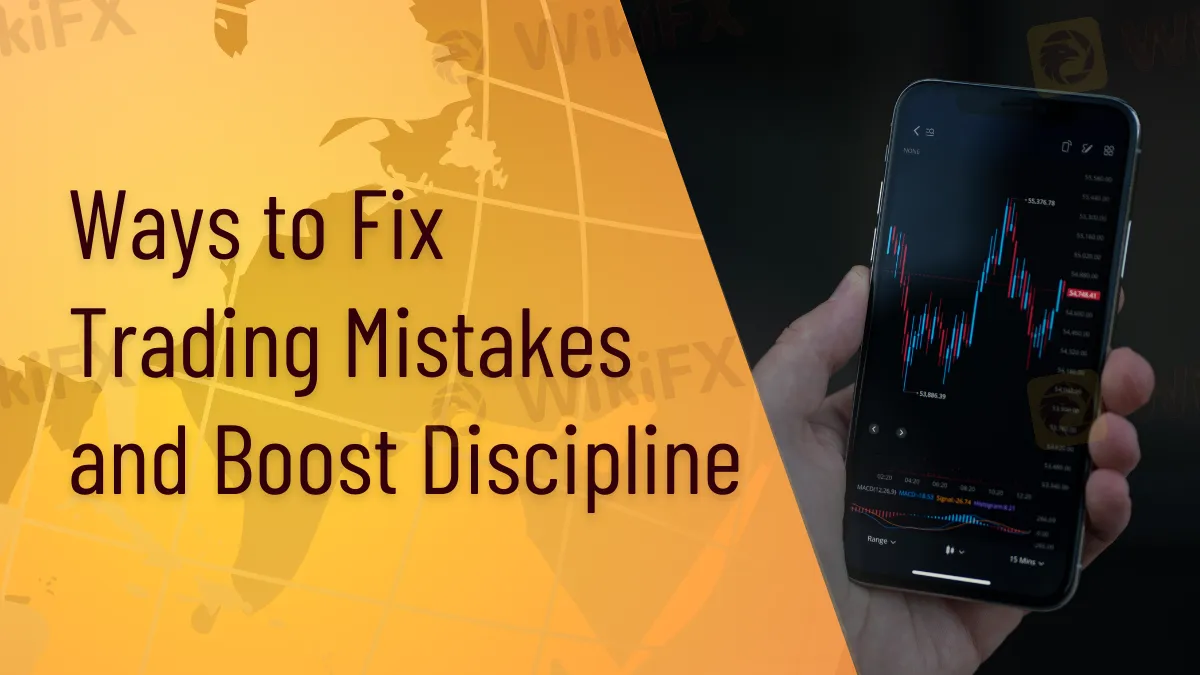简体中文
繁體中文
English
Pусский
日本語
ภาษาไทย
Tiếng Việt
Bahasa Indonesia
Español
हिन्दी
Filippiiniläinen
Français
Deutsch
Português
Türkçe
한국어
العربية
7 Simple Ways to Fix Trading Mistakes and Boost Discipline
Abstract:Struggling to stay consistent with your trading? Discover seven practical solutions to fix trading mistakes, improve discipline, and enhance your trading strategy.

The path to consistent profits can often feel elusive for beginner and intermediate traders. Mistakes are inevitable, but learning from them and developing strong discipline can set you on the right course. This article will walk you through seven simple ways to fix trading mistakes, improve your discipline, and enhance your overall strategy. Whether youre aspiring to be a professional trader or a retail investor seeking practical solutions, these tips will help you sharpen your mindset and stay on track.
Understanding Trading Mistakes and the Need for Discipline
Trading mistakes are common, especially for those new to the markets. Even experienced traders can find themselves slipping into bad habits. Mistakes such as over-leveraging, emotional trading, and poor risk management are often the culprits behind inconsistent results. The good news is that these mistakes can be corrected by developing discipline, managing risk effectively, and refining your trading strategy.
A professional trader's mindset is vastly different from that of a novice. The goal is to approach trading strategically and calmly rather than reacting emotionally to market fluctuations. Lets explore the seven key solutions that can help you make this shift and improve your trading results.
1. Take a Break from Trading
Sometimes, the most productive thing you can do is take a break. Its easy to get caught up in the daily grind of the markets, especially after a streak of losing trades. Emotions run high, and many traders feel the need to jump back into the market to make up for losses. This can lead to frustration, more mistakes, and even more significant losses.
Taking a break—whether it‘s for a week, two weeks, or longer—gives your mind the time to reset. By stepping away from the charts, you allow the emotional “dust” to settle. When you return, you’ll likely feel refreshed and more focused. This renewed perspective will help you stay disciplined and stick to your trading plan.
A simple break can often be the reset button you need to clear emotional clutter and re-establish discipline.
2. Define and Stick to Your Dollar Risk per Trade
Many traders need help with risk management. One of the most important factors is determining how much money you are willing to risk on each trade. This is a vital step in maintaining discipline and protecting your capital.
Here‘s a straightforward rule: Risk only an amount that you can afford to lose 20 times in a row without significantly impacting your account. This ensures that your emotions won’t take over if you hit a losing streak.
Equally important is ensuring that your risk amount allows you to “set and forget” trades—meaning you should be able to sleep soundly at night without worrying about the potential outcome. If the dollar risk per trade is too high, youll likely be overwhelmed by fear and emotion, clouding your judgment.
The bottom line is to calculate a risk level that works for your account size and comfort level and then stick to it. This consistency will prevent emotional trading and over-leveraging.
3. Avoid Increasing Risk Until Youve Doubled Your Account
It‘s tempting to increase your risk per trade after a few wins, but this can be a dangerous move. One or two successful trades don’t necessarily indicate long-term profitability or mastery of a strategy.
Instead, keep your risk amount the same until you‘ve doubled your account. This practice reinforces discipline, prevents emotional decision-making, and allows you to compound your success over time. Once you’ve significantly grown your account, you can consider adjusting your risk, but only after consistently applying a proven strategy.
Many traders make the mistake of increasing their risk too early, only to lose their gains and more. Patience is key. Doubling your account with steady, disciplined trades is a much stronger indicator of your skill level than any individual trade win.

4. Stop Following Economic News Too Closely
Economic news can be a huge distraction for traders. While its essential to be aware of major events, catching up on daily news reports often leads to over-analysis and second-guessing your trades.
Price action—the natural movement of the market—is the clearest reflection of all relevant information. Learning to read and interpret price charts will give you the tools to make informed decisions without being bogged down by external factors.
For many traders, cutting out the noise of economic news is a simple and effective way to reduce stress and focus on their strategy. Remember, the more variables you try to analyze, the more complicated trading becomes.
5. Simplify Your Charts
Over-complicating charts with multiple indicators is another common trading mistake. While it might seem like more data will give you better insights, it often leads to confusion and over-reliance on signals that arent always reliable.
Many successful traders eventually realize that simplicity is key. Simplifying your charts to just price action can be incredibly liberating. Indicators like RSI and MACD can be helpful, but they are optional for profitable trading.
The fewer distractions on your charts, the more you‘ll see the market’s true movements. Focus on developing a high-probability trading method based on price action alone. Youll likely find that your trading results improve as you rely less on cluttered, indicator-heavy charts.
6. Stay Off Intra-Day Charts
Intra-day charts—such as 5-minute, 30-minute, or even 1-hour time frames—can lead to over-trading and emotional decisions. Many traders become mesmerized by short-term price movements, convincing themselves they‘ve spotted a pattern or signal when, in reality, it’s often just noise.
Focusing on daily charts and higher time frames will help you avoid the trap of over-trading. You‘ll have a clearer picture of the market’s overall trend, allowing you to make more informed decisions. While intra-day charts can be useful for advanced traders, most beginners and intermediate traders will benefit from focusing on daily or weekly charts instead.
Shifting your focus to longer time frames will reduce the temptation to make impulsive trades, and your trading discipline will naturally improve.
7. Then in Doubt, Stay Out
One of the simplest yet most effective ways to avoid trading mistakes is to sit out when you‘re unsure. If you’re not 100% confident in a trade, it‘s usually better not to take it at all. Professional traders know this, and it’s a key reason why they consistently outperform amateurs.
Over-trading, or entering trades without a clear plan, is a surefire way to lose money. Discipline means only trading when your strategy signals a clear opportunity. If theres any doubt, waiting is the best course of action.
The market is always there, and there will always be another opportunity. Its better to preserve your capital for high-probability trades than to lose it on impulsive decisions.
Final Thoughts: The Path to Success
Improving your trading strategy and discipline takes time, but with these seven solutions, you can start to see meaningful progress. Trading mistakes are a natural part of the learning process, but they dont have to hold you back indefinitely.
By taking regular breaks, managing your risk properly, simplifying your approach, and exercising patience, you can steadily move toward consistent profitability. The journey from a struggling trader to a successful one requires both mindset and strategy refinement—both of which you can start working on today.
With practice, discipline, and focus, trading becomes less about chasing profits and more about following a solid, proven process. Remember, every successful trader started where you are now, and with the right tools and mindset, you can achieve the same results.
Following these steps will help you avoid common trading mistakes and build a solid foundation for long-term success. Stay disciplined, keep learning, and remain patient on your journey to becoming a professional trader.
Struggling with over-leveraging or emotional trading? Visit WikiFX's educational page for expert strategies on managing risk, simplifying charts, and trading with discipline for consistent profits.

Disclaimer:
The views in this article only represent the author's personal views, and do not constitute investment advice on this platform. This platform does not guarantee the accuracy, completeness and timeliness of the information in the article, and will not be liable for any loss caused by the use of or reliance on the information in the article.
Read more

Harsh Truths About ATC Brokers Every Trader Must Know
Many regulated brokers hide the risks associated with them. They never talk about these risks and try to attract customers with appealing offers. Later on, customers discover these hidden risks and feel disappointed. Before you come across a similar situation, we want to let you know the risks involved with ATC Broker. Check out the article to discover the harsh truth about it.

8 Golden Rules to Rule in the Forex market
These are important rules that most people won’t tell you. Whether you’re new to Forex beginner or have been trading for a while, these tips can help improve your trading journey. Read this article to learn the key rules every trader should keep in mind.

Top Reasons Why Prime FX CFD is Not Worth Your Investment
Prime FX CFD is constantly grabbing headlines, but not for the right reasons. It has become an infamous name in the forex market, which, otherwise, has become the reason for many becoming financially independent globally. Investors have been taken for granted as scams keep happening. We have found some red flags with this scam forex broker. In this article, we will let you know about them. Keep reading!

5 Clear Reasons Why Ultima Markets Is Smart Investment?
The Right Investment is hard to find these days. The Forex market is full of scam brokers, and it's a tough task to find the trusted ones. However, you can check out this article to discover 5 specific reasons why Ultima Markets stands out as a reliable choice.
WikiFX Broker
Latest News
PrimeXBT Launches MT5 PRO Account for Active Traders
eToro Expands into Singapore with MAS CMS Licence
Renault shares plunge 16% after French carmaker lowers guidance, appoints new interim CEO
Darwinex Launches INDX: A Revolutionary Investment Strategy for Traders
Top Forex Trading Scams to Watch Out for in 2025
Real Risk Factors with Admiral Markets ! Explained
5 Reasons to Know Why INFINOX Is a Standout Broker?
5 things to know before the stock market opens Wednesday
Trump's big beautiful bill' caps student loans. Here's what it means for borrowers
Weekly mortgage demand plummets 10%, as rates and economic concerns rise
Currency Calculator


